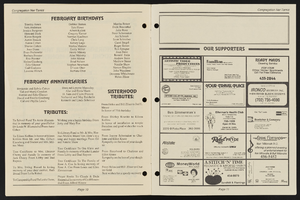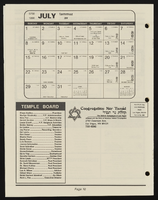Search the Special Collections and Archives Portal
Search Results
C. A. Earle Rinker Papers
Identifier
Abstract
The C. A. Earle Rinker Papers (1880-1960) contain materials that document the history of early twentieth century Goldfield, located in central Nevada, as well as the life of Rinker. Materials in the collection include correspondence, mining prospectuses, maps, ledgers, souvenirs, photographic negatives, and ephemera that document mining and daily life. Also included is biographical material that tells the story of Earle Rinker and his family before 1906 and after 1909, documenting his life in Indiana and Illinois.
Archival Collection

Margie Llorente Gonzales oral history interview: transcript
Date
Archival Collection
Description
Oral history interview with Marietta "Margie" Llorente Gonzales conducted by Cecilia Winchell, Vanessa Concepcion, and Stefani Evans on November 1 and 22, 2021 for Reflections: The Las Vegas Asian American and Pacific Islander Oral History Project. Margie Llorente-Gonzales discusses her upbringing in Manila, the Philippines and her family history within the country, recalling the lives of her parents, grandparents, and great grandparents. She talks about her childhood, educational pursuits, and courtship with her husband in the Philippines. Margie shares how she and her husband immigrated to the United States, how she adapted to her new life as an immigrant dependent on her extended family, and how she and her husband came to settle in Las Vegas. She talks about her artistic pursuits in the forms of dance choreography and performing, scriptwriting, broadcasting, and publishing newsletters. Margie also discusses her employment at McCarran Airport and her political activism, canvassing, and committee work in the Philippines and the United States.
Text
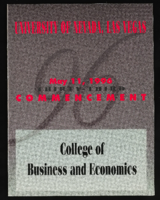
University of Nevada, Las Vegas (UNLV) College of Business and Economics 33rd commencement program
Date
Archival Collection
Description
Commencement program from University of Nevada, Las Vegas Commencement Programs and Graduation Lists (UA-00115).
Text
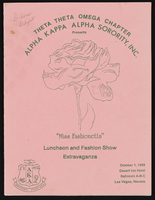
Alpha Kappa Alpha Sorority, Theta Theta Omega Chapter "Miss Fashionetta souvenier journal
Date
Archival Collection
Description
From the Alpha Kappa Alpha Sorority, Incorporated, Theta Theta Omega Chapter Records (MS-01014) -- Chapter records file.
Text

Robin Greenspun oral history interview: transcript
Date
Archival Collection
Description
Oral history interview with Robin Greenspun conducted by Barbara Tabach on February 09, 2017 for the Southern Nevada Jewish Heritage Project. In this interview, Greenspun discusses her family background and growing up in Las Vegas, Nevada. She talks about her early interest in the arts, working in television productions, and becoming a film director.
Text
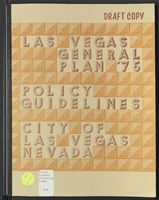
Las Vegas General Plan '75: policy guidelines
Date
Description
City of Las Vegas, Nevada general plan, draft copy.
From the introduction: "This is a document of policies. These policies are in the form of recommendations to the City of Las Vegas for planning policies in the areas of: Population and Economic Development, Land Use, Housing, Community Facilities, Conservation, Transportation, Parks and Recreation, Visual Environment, Implementation."
Text

Nanyu Tomiyasu interview, March 11, 1978: transcript
Date
Archival Collection
Description
On March 11, 1978, Sosuke Miyazawa interviewed Nanyu Tomiyasu (b. May 28, 1918 in Las Vegas, Nevada) about his family’s farm and their legacy as one of the pioneering families of the city. Tomiyasu begins by talking about what brought his family to Las Vegas, the city’s abundant water reservoir and his father’s farm. In particular, Tomiyasu discusses his father’s experiments with farming as one of the city’s early farmers, the transition into nursery farming and Japanese gardens. Moreover, he discusses his siblings, the local schools, their great quality, the successful students the city produced and the growth of school populations. Tomiyasu describes the large Japanese population and the Union Pacific Railroad that many of them worked on. He ends by discussing the change in architecture within the city, such as where old buildings stood and what they are used for now, the first Episcopal Church and the old Mormon Fort.
Text


